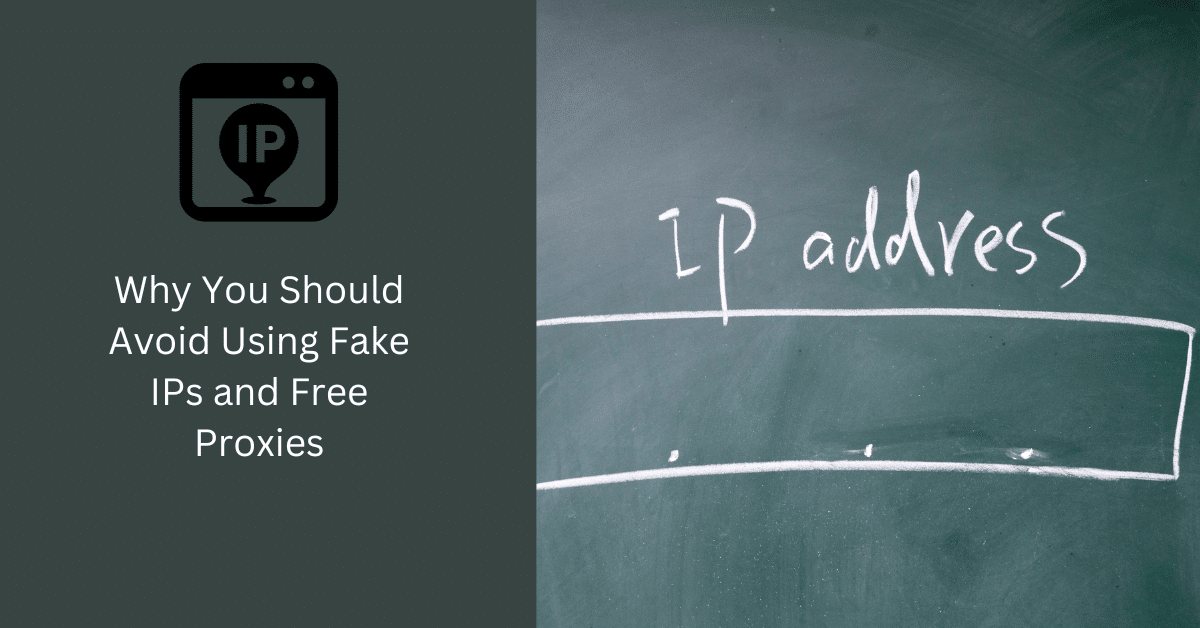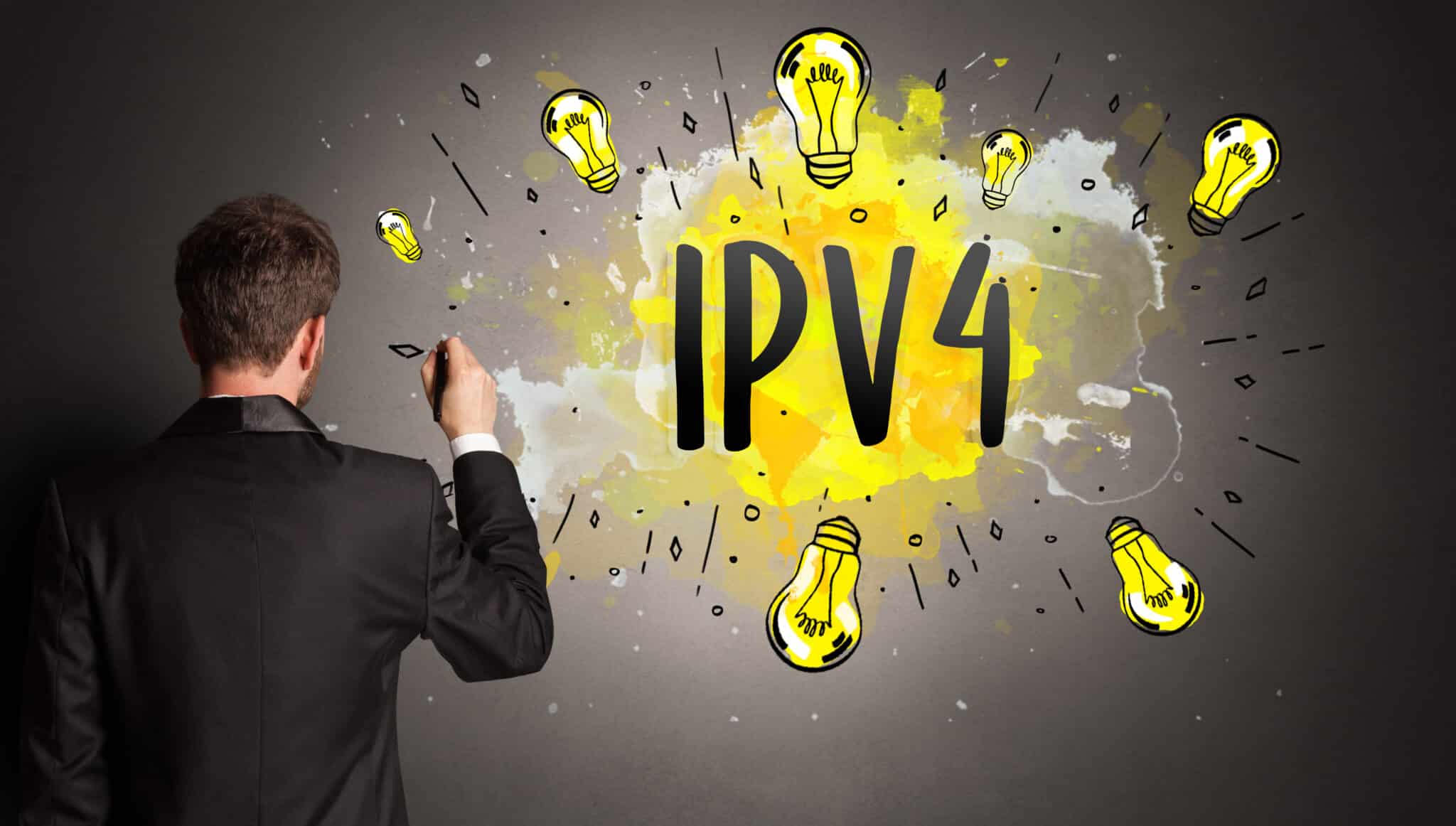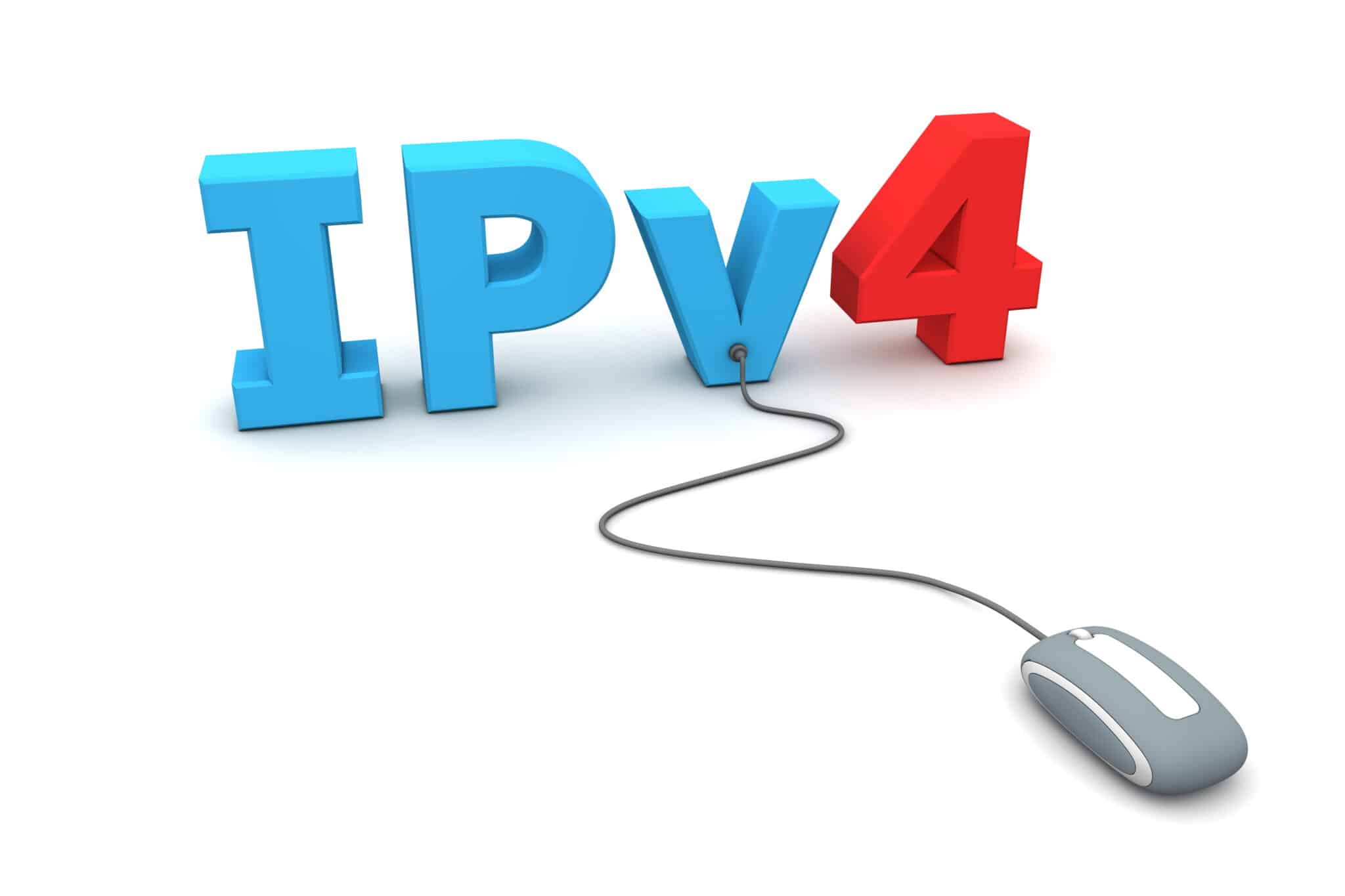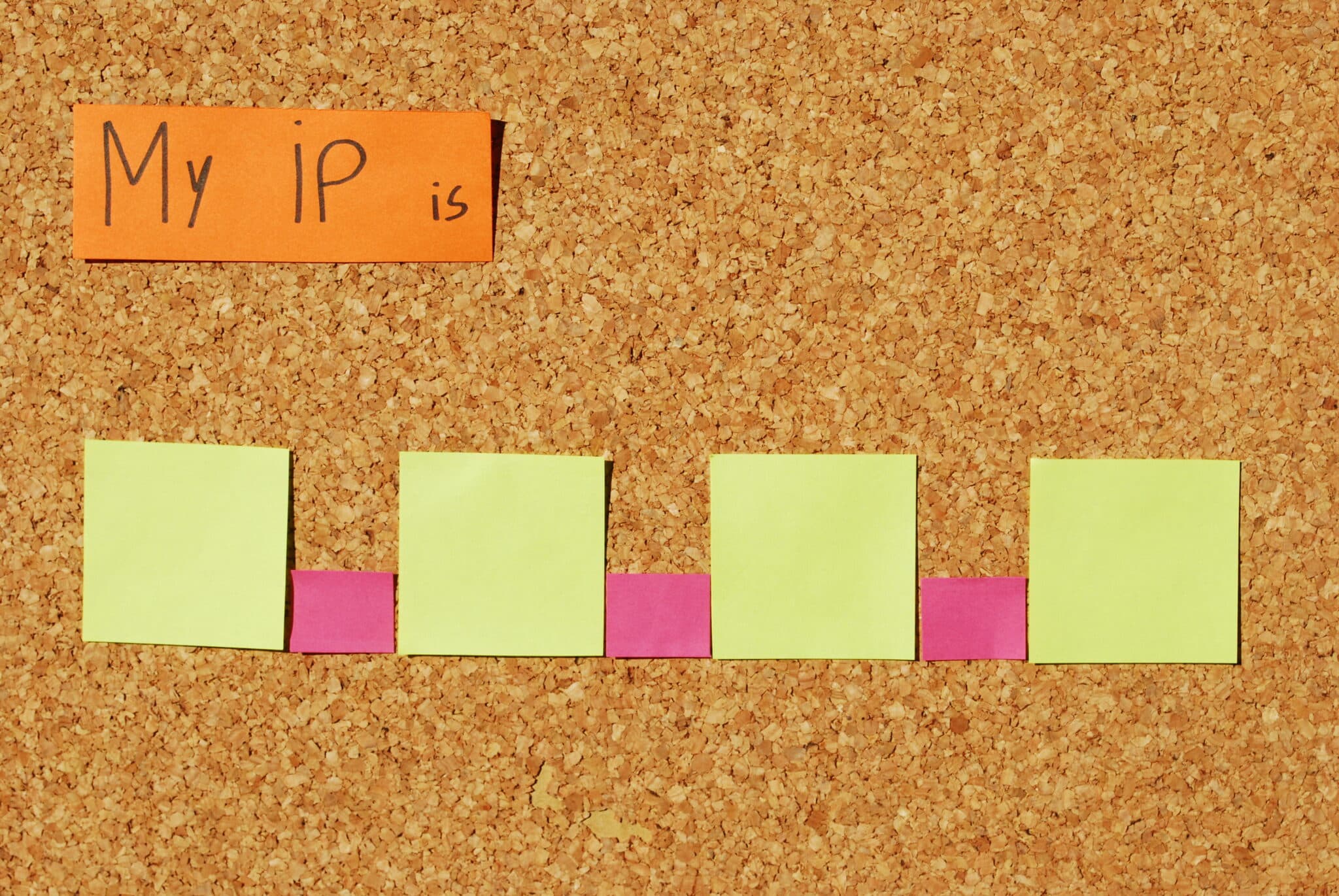
Whether you’re expanding your business, conducting research, or simply browsing the internet casually, it’s crucial to prioritize online security. Regardless of your online activities, anonymity and privacy play significant roles.
The reality is that any browser, website, system, or network can detect and potentially log your IP address. This might sound alarming, but fear not – understanding a few key details about free proxies, VPN services, and fake IPs can make a big difference.
In this blog post, we will explore the risks associated with using free software, fake IPs, and the legal implications of handling IP information. So, grab a warm cup of coffee (or tea), and let’s dive in!

What Information Does Your IP Address Reveal?
An IP address is a unique numerical code assigned to any device connected to an Internet Service Provider (ISP). It’s like an invitation to a wedding; without it, you can’t access websites or servers online. However, just like you wouldn’t want random strangers crashing your celebration, you should be cautious about who knows your IP address.
Your IP address can disclose your location, potentially revealing your country, city, zip code, and even area code, depending on your ISP. Essentially, your IP address serves as proof of your legitimacy in the online world.
Who Can Trace Your IP Address?
A multitude of entities can access and trace IP addresses, potentially invading your privacy. While this list is not exhaustive, it provides a clear picture of who might have access to your IP information. These entities include:
- Your ISP: These providers assign your IP address but also monitor your online activity, including your web traffic, search history, and connections.
- Companies: Some employers use IP addresses to monitor their employees’ online activities during working hours.
- Law Enforcement: Legal authorities can trace your IP address as part of investigations into various legal issues.
- Advertisers: Advertisers may track your IP address to understand your online interests and use this information to personalize advertisements.
- Cybercriminals: Malicious individuals may exploit your IP address to obtain personal information, which they can then sell to third parties for profit.
Why You Should Steer Clear of Free Proxies and Fake IPs
It’s tempting to seek free online solutions – everyone wants to save a buck. However, let’s face the reality that nothing is truly free. Someone, somewhere, is benefiting along the way.
You may have used free proxy providers in the past and experienced some success with them. That’s great! But did you consider that you were also divulging your private data without any assurance of privacy and security?
When you install a free proxy or VPN, you essentially grant them access to your system. While you go about your online activities, it’s possible that you’re not the only one reviewing the data being logged. This includes sensitive information such as:
- Usernames
- Passwords
- Credit card details
- Bank login credentials
- Location data
- Your internet traffic
If third parties gain access to this information, you could become an easy target for hackers. That’s a frightening prospect, isn’t it? To protect yourself, it’s vital to exercise caution regarding your online activities and the providers with whom you share your personal data.
By now, our advice should be abundantly clear – steer clear of free proxy or VPN providers!

Fake IP Generators
First and foremost, let’s clarify a common misconception – there is no such thing as a fake IP address. Every IP address represents either an active server or a device connected to the internet. The only aspect that could be considered “fake” is the existence of countless unused IP addresses.
But what about random IP generators? These tools are primarily employed by developers and programmers for various purposes, such as testing scripts, networks, or code compatibility across different browsers. In this context, terms like “mock IP” or “dummy IP” come into play. It’s essential to distinguish these terms from fake IPs:
- Mock IP Address: A mock IP address is precisely that – a simulated version of an IP. It’s not an actual IP but rather a numerical sequence that mimics an IP address.
- Dummy IP Address: Similarly, a dummy IP address resembles a real IP but lacks the capability to establish a connection. It functions as a local IP address without a response, rendering it incapable of connecting to anything.
Changing Your IP Address with Proxy Servers
If you’re looking to change your IP address, rotating proxy networks are the way to go. These networks serve as effective fake IP address generators. A robust rotating residential proxy network is your best bet for achieving both scale and maintaining anonymity online. It can successfully hide your IP address, enhancing your privacy.
Want to keep your IP hidden? Try our rotating proxy network! It automatically and instantly changes your IP with each connection, ensuring online anonymity. With over 50 million IPs in our rotating proxy pool, you’ll receive a new and unique IP address for every request, effectively serving as an excellent IP randomizer. Don’t miss out on our limited-time offer – our rotating residential proxies start at just $4/GB.
The Legal Aspects of IP Tracking
Is IP tracking legal? In short, yes, it can be legal if done with proper authorization and compliance with GDPR requirements. The legality of IP tracking depends on the context and how the gathered IP information is used.
Similarly, using a VPN service or a proxy connection to hide your IP address is entirely legal and often practiced due to the inadequate online protection.
However, when it comes to IP grabbing, spoofing, and phishing, the situation changes. While an IP isn’t considered property, it’s still classified as personal information. Therefore, it’s essential to handle your IP address responsibly when browsing the web.
IP Spoofing
Despite its playful historical origins, the term “spoofing” has evolved to signify deceptive practices today. Hackers employ IP spoofing to conceal their true location by modifying their IP address to mimic that of a trusted source. This manipulation tricks other systems, networks, and computers into believing that requests and connections are coming from a legitimate entity. Cybercriminals use this technique to initiate Denial of Service (DoS) or Distributed Denial of Service (DDoS) attacks.
- DoS Attack (Denial of Service): This type of cyber-attack renders a machine or network inaccessible and unusable. It can be achieved by overwhelming servers with excessive traffic or a massive influx of data, ultimately causing a crash.
- DDoS Attack (Distributed Denial of Service): Similar to a DoS attack, a DDoS attack involves multiple devices working in concert to disrupt a target’s services.
Phishing
Phishing occurs when malicious actors attempt to trick individuals into divulging sensitive information through deceptive means, such as emails, phone calls, or text messages. These attackers pose as trusted entities to extract specific data.
For example, you might receive an email from a colleague claiming to have lost their login information due to a software update and request your assistance in providing it. These phishing emails often mimic legitimate companies, incorporating logos, colors, and fonts to appear genuine. However, language discrepancies, poorly written content, or awkward phrasing can serve as red flags.
IP Grabbing (or IP Puller)
IP grabbing involves extracting an IP address with the aid of third-party tools. While the act itself is not illegal, certain criminal activities are associated with IP grabbing. Security professionals within companies may implement specific firewalls to monitor incoming IP addresses, ensuring that all IPs are either whitelisted or used exclusively by employees.
However, if an individual employs an IP grabber to track an IP and gather personal information with malicious intent, such as blackmail or extortion, such actions are unequivocally illegal.
In summary, understanding the nuances of IP addresses, their generation, and their potential misuse is essential for maintaining online security and privacy.
Proxies vs VPNs: Making the Right Choice for Online Security
When it comes to safeguarding your online security and privacy, making a wise choice is far better than taking unnecessary risks. While opting for a reputable service may come with a price tag, the sense of safety and protection it provides is invaluable. Let’s delve into the benefits of both proxies and VPNs to help you make an informed decision.
Benefits of Using Proxies
A proxy is a versatile tool that not only ensures your online safety but also propels your business to new heights. Here are some of the advantages of using proxies:
- Bypass Geographical Restrictions: Proxies enable you to navigate around geographical restrictions, giving you access to content that may be otherwise unavailable in your region.
- Unblock Online Content: With proxies, you can effortlessly unblock restricted online content, expanding your online horizons.
- Enhance Privacy and Anonymity: Proxies significantly boost your privacy and anonymity while browsing the internet, making it challenging for websites to track your online activities.
- Effortless Data Scraping: Proxies are a valuable asset for web scraping, allowing you to gather vast amounts of data with ease. Fineproxy even offers a No-Code Scraper, simplifying the process further.
At Fineproxy, we offer two types of proxies—residential and datacenter proxies. Both provide online protection and facilitate web scraping, but they differ in their approach. Datacenter proxies utilize virtual servers, while residential proxies employ real IPs from mobile and desktop devices. Notably, residential proxies are more challenging to detect, making them ideal for individuals managing multiple social media accounts and demanding high scalability.

Benefits of Using a VPN
For individual users seeking to bolster their online security and browse the web anonymously, a VPN is an excellent choice. VPNs offer several advantages, including:
- IP Concealment: A VPN conceals your IP address and encrypts your data, ensuring your online activities remain private and secure.
However, it’s important to note that using a VPN does not hide the fact that you are utilizing their services. Additionally, most VPNs rely on datacenter servers, limiting their suitability for tasks requiring high scalability, such as managing multiple accounts or web scraping. Furthermore, VPN IPs are often shared among multiple users simultaneously, increasing the likelihood of detection.
In this whirlwind of information, you’ve gained a clearer understanding of the distinctions between reputable, paid providers and free proxies or VPNs. The bottom line is that the risks associated with free services far outweigh any potential benefits.
With trusted providers like us, you can browse the web securely and seamlessly conduct your online activities. Consider the treasure trove of advantages we offer, including flexible pricing, various subscription plans, high-speed connections, and access to millions of IPs worldwide. Go ahead, pretend that none of these piques your interest – we’ll be here whenever you’re ready to prioritize your online security and privacy.
What is the importance of online security?
Online security is crucial to protect your personal information and data from theft, hacking, or unauthorized access. It ensures a safe and private online experience, safeguarding your sensitive data.
What is the difference between a proxy and a VPN?
A proxy acts as an intermediary server that reroutes your internet traffic through its own IP address. It can provide anonymity and help bypass geo-restrictions. A VPN (Virtual Private Network) encrypts your entire internet connection, hiding your IP address and offering a high level of security and privacy.
Are free proxies and VPNs safe to use?
Free proxies and VPNs often come with risks. They may not provide adequate security, could log your data, or even expose you to malware. It’s generally recommended to use reputable paid services for better protection.
What are the benefits of using proxies?
Proxies can help you bypass geo-blocks, access restricted content, enhance privacy, and facilitate tasks like web scraping. They are especially useful for managing multiple social media accounts and high-scale data gathering.
What are the benefits of using a VPN?
A VPN offers complete online anonymity by hiding your IP address and encrypting your data. It secures your internet connection, making it ideal for secure browsing, online transactions, and protecting your data from prying eyes.
Is IP tracking legal?
IP tracking can be legal when done with proper authorization and compliance with privacy regulations like GDPR. However, using IP tracking for malicious purposes, such as harassment or unauthorized data collection, is illegal.
Can a proxy or VPN increase internet speed?
In some cases, a proxy or VPN may improve internet speed by bypassing network restrictions or reducing network congestion. However, it can also introduce some latency due to rerouting traffic through additional servers.
What is the difference between residential and datacenter proxies?
Residential proxies use real IP addresses from mobile and desktop devices, making them harder to detect. Datacenter proxies, on the other hand, use virtual servers. Residential proxies are often preferred for tasks requiring higher anonymity.
Can I use a proxy or VPN for torrenting and P2P file sharing?
Yes, both proxies and VPNs can be used for torrenting and P2P file sharing. However, it’s important to choose a provider that allows and supports these activities and offers strong encryption for your security.
How can I choose a reliable proxy or VPN service?
To choose a trustworthy service, look for providers with a good reputation, strong encryption, a no-logs policy, a wide server network, and responsive customer support. Read reviews and consider your specific needs, such as web scraping or privacy requirements.


Comments (0)
There are no comments here yet, you can be the first!